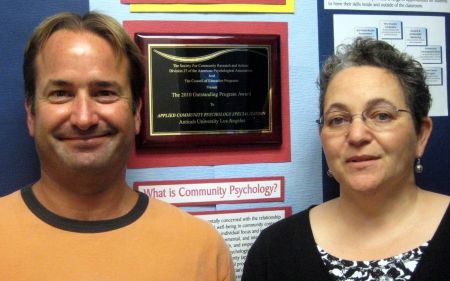

Commentary: Lobbying for Endorsement of Community Psychology in Australia and the Invisibility of Community Psychology in the United States
Sylvie Taylor, Ph.D. and Gregor V. Sarkisian, Ph.D.
Antioch University Los Angeles
The challenges faced by our Australian colleagues raise a range of questions about the future of Community Psychology (CP) in contexts that have become increasingly focused on the legitimizing of academic programs and professions by bureaucratic governmental entities whose understanding of the disciplines and professions they seek to legitimize may be limited at best. More importantly, their struggle points to challenges within academic psychology, as CP continues to struggle for a place at the table of organized psychology. Perhaps the greatest lesson in the narrative of this struggle was how some of the tools of the discipline were used to resolve what was perceived to be a crisis threatening the very survival of CP in Australia.
Download the PDF version of the article, including all commentaries, tables, and figures.
Commentary: Lobbying for Endorsement of Community Psychology in Australia and the Invisibility of Community Psychology in the United States
The challenges faced by our Australian colleagues raise a range of questions about the future of Community Psychology (CP) in contexts that have become increasingly focused on the legitimizing of academic programs and professions by bureaucratic governmental entities whose understanding of the disciplines and professions they seek to legitimize may be limited at best. More importantly, their struggle points to challenges within academic psychology, as CP continues to struggle for a place at the table of organized psychology. Perhaps the greatest lesson in the narrative of this struggle was how some of the tools of the discipline were used to resolve what was perceived to be a crisis threatening the very survival of CP in Australia.
In the United States, CP has a long-standing history of invisibility within mainstream psychology. Clinical psychology and its close cousin, counseling psychology, have dominated the realm of applied psychology for so long, that the lay public believes “psychology” to be synonymous with psychological distress, “mental illness” “counseling” and “therapy.” CP is similarly invisible within academic psychology, as evidenced by its very limited presence or complete absence from introductory psychology textbooks in the United States (Sarkisian, Taylor, & Council of Education Programs, 2009) and as a domain of instruction in many psychology departments. This invisibility is compounded by the fact that community psychologists have articulated a paradigm whose assumptions and practices diverge significantly from traditional applied psychology in problem definition, levels of analysis, types of research, interdisciplinary ties, ethics, roles of then professional and service recipient, and the focus, timing, and type of intervention (Nelson & Prilleltensky, 2010). In many ways CP is additionally marginalized within the dominant traditional models of psychology because our work often focuses on working with people who are themselves marginalized by the social system and by traditional deficit-based approaches that have no models for effectively addressing the impact of social oppression or working beyond the individual to manifest change.
The narratives of our Australian colleagues beautifully illustrate how as a marginalized community, we as community psychologists, can use our own values, theories and methods to effect change for ourselves and CP. Much of the work reported in the summary of activities reads like a textbook on community organizing and coalition building, illustrating along the way how bringing theory to practice is often fraught with unanticipated challenges. Within the U.S., CP has gained professional recognition through the Society for Community Research and Action (SCRA), Division 27 of the American Psychological Association, yet, we still remain invisible.
With a membership approaching 800, and monetary resources, SCRA is in the best position it has ever been in to facilitate organized efforts to increase visibility of CP within the U.S. and internationally. Recent developments within SCRA, such as the legitimization of the Community Psychology Practice Council (CPPC) with voting power on the executive committee, the decision to hire an executive director of SCRA, or the recent development of the SCRA Public Policy Committee, reflect steps toward greater inclusion and a more proactive focus. Further, several councils of SCRA have already engaged in activities to raise visibility of CP. For example, the Council of Education Programs (CEP) has engaged in letter writing campaigns to text-book authors to lobby for greater inclusion of CP content in introductory psychology texts and has partnered with Idealist.org to promote graduate education in CP at graduate school fairs with volunteers from SCRA sitting at tables and talking with fairgoers about CP and CP training. While these efforts are effective outreach on a small scale, they are ameliorative in nature, reaching one author or one potential student at a time. A transformative approach would focus efforts to raise visibility on a large scale, seeking to effect change on the macro level with entities such as the APA, the National Institutes, Text Book Publishers, University systems, and U.S. State and Federal Governments. Challenging the dominant value on the deficit-based model and raising awareness of more inclusive and holistic approaches utilized by community psychologists among macro level entities would be a difficult endeavor.
Unlike our Australian colleagues who were presented with a threat great enough to mobilize individuals into action, we in the U.S. have no such threat other than sustained invisibility in the shadow of a deficit-model. If the members of SCRA believe that increased visibility is important for the field and the work is beneficial to communities, then they could mobilize to increase the visibility of CP. There is likely little doubt among community psychologists that the profession has the means to accomplish the desired end of increased visibility. However, there may be a concern that sustained invisibility, a threat associated with CP in the U.S. since its inception in 1965, would not be considered a threat but rather a comfort zone.
While we cannot ensure that legislators, accrediting bodies, professional blocks, and our fellow psychologists know what CP is and how community psychologists work, we can, as a professional community ensure that we continue to create opportunities to educate them. Additionally, we can engage in organizations, such as the SCRA, to facilitate large scale efforts targeted toward raising the visibility of CP through transformative approaches which best utilize its members and financial resources.
References
Nelson, G., & Prilleltensky, I. (2010). Community Psychology: In Pursuit of Liberation and Well-Being (2nd Ed.). Palgrave Macmillan.
Sarkisian, G.V., Taylor, S., & Council of Education Programs (2009). Rating of introductory
psychology textbooks with community psychology content. The Society for Community Research and Action. http://www.scra27.org/resources/educationc/ratingofcommunitypsychologycontentinintrotexts.pdf
 Sylvie Taylor, Ph.D. and Gregor V. Sarkisian, Ph.D., Antioch University Los Angeles
Sylvie Taylor, Ph.D. and Gregor V. Sarkisian, Ph.D., Antioch University Los Angeles
Sylvie Taylor, Ph.D., Professor, Founding Director, Applied Community Psychology Specialization and recipient of the 2008 Society for Community Research and Action Outstanding Educator Award. Antioch University Los Angeles, 400 Corporate Pointe, Culver City, CA 90230. staylor@antioch.edu 310/578-1080 x256.
Gregor V. Sarkisian, Ph.D., Associate Professor, Director of the Master of Arts in Psychology, Individualized Concentration and Core Faculty in the Applied Community Psychology Specialization. Antioch University Los Angeles, 400 Corporate Pointe, Culver City, CA 90230. gsarkisian@antioch.edu 310/578-1080 x330.
agregar comentario
palabras clave: Australian Community Psychology, community psychology practice, gjcpp